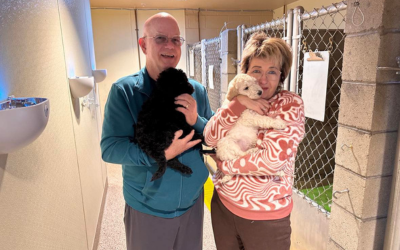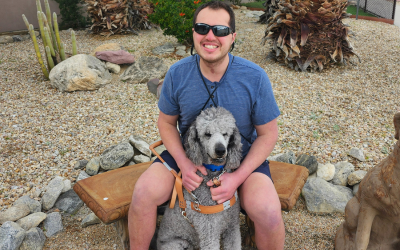
Bob and Ewa with puppies
Guide Dogs of the Desert is a nonprofit organization dedicated to providing life-changing independence to the visually impaired. Based in Whitewater, California, they breed, raise, and train guide dogs to help individuals navigate the world with confidence and companionship. Through their rigorous training programs, these remarkable dogs become invaluable partners, assisting their clients in tasks such as crossing streets, navigating public spaces, and even detecting obstacles.
To ensure their continued ability to serve the community, Guide Dogs of the Desert has established two endowment funds with the IECF. The Secure Our Future Fund provides a stable financial foundation for the organization’s long-term operations, while the Lehmer Endowment Trust Fund supports specific initiatives and programs. All donations are welcome to these funds, which play a crucial role in enabling Guide Dogs of the Desert to continue their mission of empowering the visually impaired.
Thanks to a recent grant from the Gracie Gagnet Memorial Fund (named for the fund owners’ beloved family pet), Guide Dogs of the Desert can address a growing need for custom-training guide dogs that will provide vital mobility, companionship, and independence for the blind.
“The recent grant funding through Inland Empire Community Foundation (IECF) is important and will go directly to the support our organization’s training program for guide dogs,” says Robert Maher, Executive Director of Guide Dogs of the Desert. We’ve had to increase the number of puppies we have every year because there’s currently about a three-year waiting list of students looking to get a dog from us.”
To address that need, the organization has increased the number of puppies it works with each year, from 50 to 65.
“That sounds easy on the surface,” Maher adds, “but the challenge with that is now, every year, we need to have 65 puppy raisers who come and volunteer with us.”
Show of hands, anyone?
Overall, this bodes well for those in need of guide dogs in the Valley, but Maher is quick to note the rare emotional journey breeder hosts and puppy raisers embark on because the dogs must eventually return to the organization and be placed out.
“The puppy raisers are one, if not the most important part of the whole program,” Maher says, “because we can’t train those guide dogs without those puppies having had that 18 months of a good solid foundation.
“I always emphasize the importance and the appreciation we have of our volunteer puppy raisers,” he adds. “We are constantly looking for more puppy raisers, and they must recognize that they are truly changing somebody’s life by doing their work. We only trained that dog to become a guide dog for six months. They trained that dog for 18 to 24 months on how to be a good dog. That is really very significant.”
The level of training is, in fact, more than a regular household person would do for a house pet. Then the dog is freely returned to the organization.
“That dog now goes off to ‘college,’ as we call it, and that is for guide dog training,” Maher says. “For six months, it’s constantly being reviewed and evaluated in order to make sure that it’s meeting the requirements of being an active working guide dog.”

Dallas and Reed
At that point, the organization matches a dog and its characteristics with an individual student who comes from across the country.
“We do a very special matching program where we interview the student who’s looking for the dog, and we see what their lifestyle is like,” Maher stresses. “One gentleman likes to go hiking and so we need a dog that’s able to go hiking. Another woman is in her late eighties, and she came to us letting us know she plays golf every day, so we had to train that dog to be able to ride on the golf cart with her.”
But while having more puppies annually is exciting, another reality has set in.
“A big part of the whole puzzle, is that we need that many more puppy raisers every year,” Maher says. “It’s just a challenge to get those puppy raisers.”
The good news: The organization accepts qualified individuals to be a puppy raiser from anywhere.
“We actually have one couple, snowbirds from Canada, and they’re here for the winter season, and they raise a puppy for us,” Maher says. “In summer, they go back to Canada. We stay in contact with them and then they come back. They’ve done several puppies for us.”
No doubt the organization’s reach remains significant. It also provides support canines for Palm Springs Police Department, Desert Hot Springs Police Department, and the Garden Grove Police Department.

Gracie, our donors’ beloved pup for whom the fund is named
Volunteers and donations—even of time—are always welcome.
On that note, it costs about $10 for two lattes. But for that same amount, a donation to Guide Dogs of the Desert can provide a Kong toy for any number of its developing Guide Dogs in Training.
In lieu of a $100 massage, those funds allow Guide Dogs of the Desert to provide shampoo and grooming supplies for the dogs on campus during their training.
That’s something to wag a tale over.
Learn more at guidedogsofthedesert.org.
Stay up to date on all the good work we’re doing through the power of philanthropy. Sign up for our eNewsletter, Philanthropy Matters, today.


